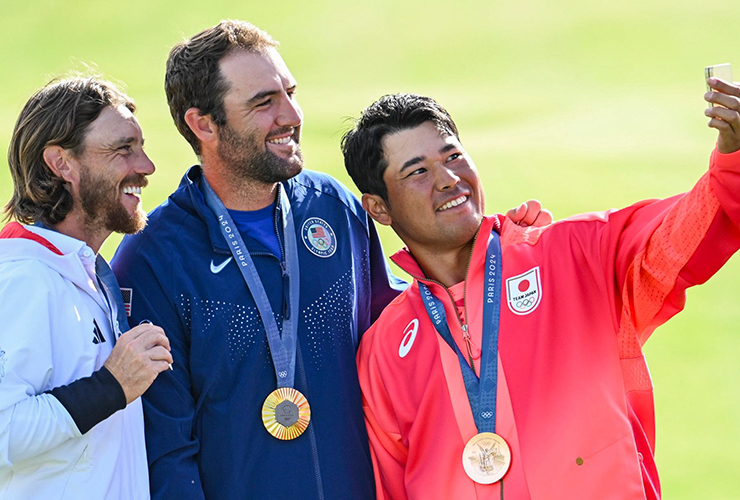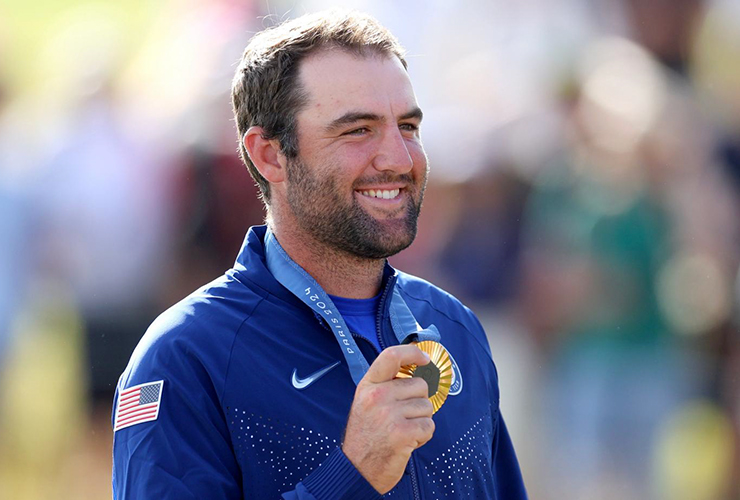After Zika in Rio and COVID in Tokyo, the Olympics in Paris have been golf’s travelling Mulligan. With the target a veritable island green, the sport’s purposely struck ball hasn’t quite landed yet, but it’s tracking like a Scottie Scheffler 7-iron.
Before contact, golf’s leaders were under plenty of pressure to show their game can find a prominent and secure place in the greatest athletic show on earth. Critics were carping that playing the men’s and women’s tournaments at 72-hole medal play squandered a golden opportunity to give the world a more innovative and exciting format. They contended that some combination of match play, team play, or mixed play would attract more new players and improve golf’s still stodgy image. Meanwhile, the fact that the game’s top players had become dramatically richer since the 2020 Olympics raised more doubts about how passionately the stars would compete.
But as they arrived in Paris, the players’ comments revealed a higher level of enthusiasm for the surroundings and the occasion. Then the men’s tournament satisfyingly produced three stimulating rounds of stroke play, followed by a final round that provided a Sunday finish that would rate with the most memorable major championships of recent years.
It was a convincing demonstration of medal play as the truest test of championship golf, strongly suggesting that golf in the Olympics golf doesn’t need to change much, if at all. There are indications some form of mixed-team play will be incorporated at Riviera Country Club for the Los Angeles Games in 2028. But it won’t make or break golf in the Olympics. As Paris showed, all golf needs to become part of the Olympic fabric is little time and a fair chance.
We’re only halfway home, of course, with the women’s battle for medals now underway. But there’s zero concern about ambivalence from the best women pros, for whom playing in the Olympics means an unparalleled opportunity to lift their profiles and their game. Consider that 14 women have played in all three Olympics, compared to only four men. And just like the men, who gratefully took energy from the teeming gallery, all 30,000 tickets to each round of the women’s tournament have been sold.
As it turned out, the men really, really cared. Jon Rahm, who had a four-stroke lead with eight to play, only to falter so badly that he didn’t medal, displayed a depth of disappointment in his gamely controlled post-round comments that renders simplistic his label of LIV mercenary. To me, that vulnerable and honest display by that particular golfer may go down as the moment golf and the Olympics were finally bonded.
Similarly, Scheffler, the winner who can be simplistically presumed a flatliner, couldn’t hold back the tears during the national anthem. In his last-round 62, Scheffler dug very deep, fighting his normally reliable driver but making up for it with miraculous irons shots from deep rough that can be legitimately called Nicklausian. And then, with birdies on four of the last five holes, Scheffler did what those who feel his immense skill remains underappreciated have been longing to see—the kind of clutch putting comeback that alters perceptions and can change careers.
The way Scheffler passed half a dozen guys on a stellar leaderboard with his closing 29 reminded me of Willie Mays at an All-Star Game (he played in 24 of them), using the grandest stage to show he was the best of the best. To my mind, only Armand Duplantis’ theatrical world record pole vault before a packed stadium, and Novak Djokovic attaining the career Golden Slam in tennis has had a more electrifying and moving individual performance in Paris. And one through which Scheffler single-handedly made Olympic golf bigger.
In his superb game story on Sunday, our Mike Stachura led with a comparison of Scheffler’s finish to American Billy Mills’ closing sprint to win the 10,000 meters at the 1964 Olympics. A reference I loved, because it hits the bigger point.
Which is that as good as the golf was, what really validates a sport in the Olympics is, simply, the Olympics. Just by being accepted into the Games, and then just by being itself, a worldwide sport—table tennis being a good example—gets a bump in prominence. And when there are outstanding individual performances like Scheffler’s, that bump becomes more significant. As intended by golf’s organisational leaders, the niche sport will grow less niche-y.

Gold medal winner Scottie Scheffler poses for a selfie with Japan bronze medalist Hideki Matsuyama and Great Britian silver medalist Tommy Fleetwood – Keyur Khamar
Perhaps I’m overstating. I will admit that as an old guy who grew up on its iconography, I’m a sucker for the Summer Games. My favourite movie as a kid was the 1951 biopic “Jim Thorpe: All American,” in which the best montage is Burt Lancaster as Thorpe killing it in the decathlon at the 1912 Olympics. I remember eating Wheaties before going to school from a box with two-time gold medal winning pole vaulter Bob Richards on the cover. And in 1968, I had the great fortune of attending the entire two weeks of the Mexico City Games and seeing just about every famous moment from that most momentous Olympics.
This year, through the TV screen (thank you Peacock), Paris brought back some of that old feeling. A great city on display for the world creates epic backdrops of beauty, scope and grandeur, and for the athletes, an energising feeling of mankind at its best. I was a young reporter at the Los Angeles Games in 1984 and could sense that magical air at the different venues, and it seemed that Paris has it as well. Le Golf National projected even better than it did at the 2018 Ryder Cup, its dangerous closing holes coming into play more often than they would in match play, weaving between the spacious amphitheaters so that the climatic moments were both more intimate and pressure packed.
But maybe the best thing about the golf in this Olympics is the timing. Right now, in a period of unprecedented destabilization and greed, the sport needs a counterpoint. The golfers themselves are ready for one and were happy to elevate Paris into that role in a way that wasn’t forced. Rory McIlroy, referencing the Ryder Cup and the Olympics, released some pent-up frustration when he said, “I think with how much of a shit show the game of golf is right now, and you think about the two tournaments that might be the purest form of competition in our sport, we don’t play for money in it. … It speaks volumes for what’s important in sports.”
And Scheffler got to the heart of the matter when he told the AP’s Doug Ferguson that the Olympics are “the rawest form of competition and it has an old school feel to it when you play the game because you love it.”
In the most romantic city in the world, that feel was apparent among the competitors in the men’s tournament and will be in the women’s as well. And after golf’s Mulligan has landed and Los Angeles becomes the next Olympic target, the golfers who took part in the turning point can begin to say to each other, “We’ll always have Paris.”









